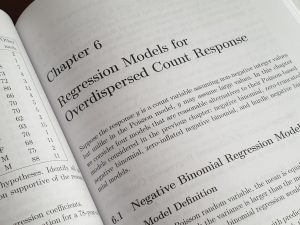
Econometrics, the application of statistical methods to analyze economic data, has become an invaluable tool for financial professionals. In today’s complex and ever-changing financial landscape, understanding the relationship between economic variables and their impact on financial markets is crucial. Econometrics provides a systematic approach to studying these relationships, allowing professionals to make informed decisions based on data-driven analysis. This article aims to provide an overview of econometrics, highlighting its advantages in the field of finance. Whether you are a seasoned financial expert or someone with limited understanding of the topic, this article will help you grasp the significance of econometrics as a useful tool for financial professionals.
Overview of Econometrics
Econometrics is a potent instrument that holds tremendous value for financial professionals. Its power to analyze and anticipate fiscal trends and results offers a thorough look into the fiscal landscape. Through the application of a variety of statistical techniques, econometrics helps assess the effect of economic policies on the financial markets. This allows experts to gauge the implications of various policies on investment decisions. Additionally, econometrics facilitates the recognition of connections between distinct economic variables, such as interest rates, inflation, and employment, enabling financial professionals to make informed decisions regarding investments and other financial activities, thus giving them a competitive advantage in the ever-changing world of finance.
Having a comprehensive and concise overview of the economic landscape is essential for making educated decisions in the realm of finance. Econometrics provides this overview by analyzing and condensing complex financial data into easily understandable patterns and trends. Through the utilization of statistical tools and models, econometrics allows professionals to determine key variables and their relationships, illuminating the intricate mechanisms of the financial markets. By boiling down information into succinct bullet points, econometrics boosts readability and comprehension, enabling financial professionals to promptly comprehend the underlying patterns and make prudent decisions with assurance.
Bullet points offer one of the major advantages of econometrics, summarizing information effectively and succinctly. By utilizing bullet points, financial professionals can display complex data in a format that is readily intelligible for both themselves and their stakeholders. Bullet points permit the organization of information in a logical fashion, spotlighting the essential findings and insights gained from the econometric analysis. This format not only enhances the readability of the data but also improves comprehension and retention, making sure that the critical takeaways are effectively conveyed. By exploiting the power of bullet points, financial professionals can present their discoveries in a clear and concise manner, allowing stakeholders to make informed decisions based on the econometric analysis.
Advantages of Using Econometrics in Finance
Exploiting the potential of econometrics in finance can bring plentiful advantages to financial professionals. By applying statistical models and methods to financial data, econometrics affords the capacity to forecast market trends and outcomes, thereby giving professionals an upper hand in handling the ever-changing financial environment. Moreover, it is able to evaluate the repercussions of economic policies on the financial markets, enabling experts to comprehend how modifications in, for instance, interest rates or tax reforms, can affect the performance of different financial assets. This data can be of immense worth in portfolio administration, hazard assessment, and strategic decision-making.
Furthermore, econometrics can discover relationships between economic variables. By analyzing extensive datasets and utilizing statistical techniques, financial professionals can discover correlations and causal connections between components such as interest rates, inflation, and employment. This knowledge can supply valuable insights into how modifications in one factor may influence others, aiding professionals in making more informed decisions regarding their investments and financial activities. Additionally, econometrics can aid in understanding the root causes of market behavior, facilitating the formation of trading strategies and risk management techniques.
Analyzing Financial Trends and Outcomes with Econometrics
Uncovering financial trends and gauging outcomes through econometrics is a critical part of sound fiscal decision-making. By utilizing econometric techniques, those in the financial sector can glean valuable insights into the patterns and movements within the market. Examining historical data and utilizing statistical models, econometrics allows for a comprehensive assessment of economic trends. This analysis can offer a more profound understanding of the forces steering the market and enable professionals to make more informed investment decisions.
Econometrics also plays an indispensable role in forecasting economic outcomes. By analyzing past data and discovering patterns, financial professionals can apply econometric models to predict future market tendencies. This predictive capabilities are especially advantageous in helping investors and financial institutions anticipate potential market changes and adjust their strategies accordingly. By capitalizing on econometrics, financial professionals can effectively plan and prepare for potential market fluxes, aiding in the reduction of risks and optimization of returns.
Moreover, econometrics enables financial professionals to evaluate the impact of economic policies on the financial markets. By using econometric models, financial professionals can assess how changes in economic policies, such as interest rate adjustments or fiscal stimulus measures, may affect financial outcomes. This analysis provides valuable insights into the possible effects of policy decisions on various sectors of the economy, allowing financial professionals to adjust their strategies accordingly.
Moreover, econometrics facilitates financial professionals in recognizing connections between different economic variables. By studying data on variables such as interest rates, inflation, and employment, econometric models can uncover the intricate links between these factors. This comprehension of interdependencies can help financial professionals make more precise predictions and devise strategies that take into account the complex interactions within the market.In conclusion, analyzing financial trends and outcomes with econometrics is a potent tool for financial professionals. It allows for a comprehensive assessment of market patterns, the ability to predict future outcomes, and the evaluation of policy impacts. Additionally, econometrics assists in identifying relationships between economic variables, facilitating more informed decision-making. By leveraging the insights gained through econometric analysis, financial professionals can traverse the complexities of the financial landscape with greater assurance and success.
Assessing the Impact of Economic Policies on Financial Markets
Analyzing and forecasting the repercussions of economic policies on financial markets is a critical role for financial experts. Econometrics, a useful instrument in finance, gives a systematic approach to examining and predicting financial trends and results. By making use of econometric models and strategies, specialists can assess the effects of various economic policies on the financial markets. This allows them to comprehend how policies such as interest rate modifications, tax reforms, or trade agreements influence stock prices, exchange rates, and overall market stability. Through econometrics, financial professionals acquire valuable insights into the connection between economic policies and financial market dynamics, enabling them to make informed decisions.
Furthermore, econometrics has a fundamental part in recognizing and quantifying the causal relationships between different economic variables. For instance, through econometric analysis, financial professionals can determine the relationship between changes in interest rates and inflation rates. By assessing the impact of economic policies on these variables, they can make informed predictions about future inflation trends, which is essential for investment decision-making. Econometrics permits for the identification of meaningful connections between economic variables, helping professionals gain a stronger comprehension of the intricate interplay between policy actions and financial market outcomes.
Moreover, econometrics empowers financial experts to assess the effectiveness of economic policies in achieving desired outcomes in the financial markets. By studying the historical data and employing econometric models, professionals can evaluate whether specific policies have delivered the intended results. For example, they can examine the effect of government stimulus packages on economic growth or the effects of regulatory measures on market volatility. This appraisal helps policymakers and financial professionals refine their strategies and make data-driven decisions that are consistent with their objectives.
In conclusion, econometrics furnishes a strong set of tools for assessing the impact of economic policies on financial markets. By utilizing econometric models and techniques, financial professionals can analyze and predict financial trends, identify relationships between economic variables, and evaluate the effectiveness of policies. This equips them to make informed decisions and navigate the complexities of the financial landscape. With econometrics, professionals gain a deeper understanding of the intricate connections between economic policies and financial market outcomes, ultimately leading to more effective policy implementation and more successful financial strategies.
Identifying Relationships between Economic Variables
Unearthing connections between economic factors is a critical element of financial analysis. Econometrics can provide a wealth of knowledge about how diverse factors influence each other. For instance, econometrics can help uncover the relationship between interest rates and inflation, allowing professionals to foretell the effect changes in one variable may have on the other. This intelligence can be of great value when making decisions pertinent to investments or other financial undertakings. Additionally, econometrics can be employed to scrutinize the correlation between employment and economic growth, offering a deeper understanding of how adjustments in one variable may affect the other. Through this recognition, financial professionals can make informed decisions and create strategies based on reliable data and examination.
Furthermore, econometrics can also assist in evaluating the impact of certain economic policies on financial markets. By analyzing historic data and applying statistical models, financial professionals can measure how certain policies may affect variables such as stock prices, exchange rates, or market volatility. This information can be invaluable when formulating investment strategies or managing risk. Econometrics can give knowledge into the intricate interplay between distinct economic variables, enabling professionals to predict potential outcomes and adapt their approaches accordingly. It is through this recognition of relationships that financial professionals can grapple with the complexities of the market and make informed decisions that can lead to success. In summary, recognizing relationships between economic variables through econometrics is an indispensable instrument for financial professionals looking to comprehend and predict market trends, assess policy impacts, and make informed decisions in the continually evolving realm of finance.
Making Informed Decisions with Econometrics
Financial professionals must make knowledgeable choices utilizing econometrics to guarantee success in the finance industry. This method offers a powerful technique for assessing and forecasting financial trends and results. By taking advantage of statistical models and techniques, econometrics grants professionals the capacity to evaluate past data and make educated guesses about the future market movement. This empowers them to spot danger and uncover potential opportunities, allowing them to create strategies that maximize returns and minimize losses. Through econometrics, financial professionals can obtain valuable knowledge into market dynamics and make data-driven decisions that can greatly affect their investment tactics. With the help of econometrics, they can traverse the intricate world of finance with trust and accuracy.
Additionally, econometrics plays an essential role in assessing the influence of economic policies on financial markets. By examining the relationship between various economic factors, such as interest rates, inflation, and employment, econometric models can reveal how changes in policies can impact market conditions. This comprehension can help financial professionals predict market impacts to policy changes and adjust their strategies as needed. In addition, econometrics assists in discovering connections between different economic variables, permitting professionals to uncover concealed patterns and correlations. Armed with this understanding, they can make informed decisions about investments, spot potential risks, and develop strategies that conform to market trends and conditions. In the ever-shifting landscape of finance, utilizing econometrics is an indispensable tool for making wise decisions that can lead to financial success.
Conclusion
In conclusion, econometrics proves to be an invaluable tool for financial professionals, allowing them to analyze trends, assess the impact of policies, and identify relationships between economic variables. Its ability to provide data-driven insights and inform decision-making processes makes it a must-have skill in today’s finance industry. By utilizing econometrics, professionals can make informed decisions and navigate the complexities of the financial landscape with confidence. Whether you’re a seasoned expert or someone with a basic understanding of the topic, this article has provided valuable insights into the world of econometrics and its applications in finance.


